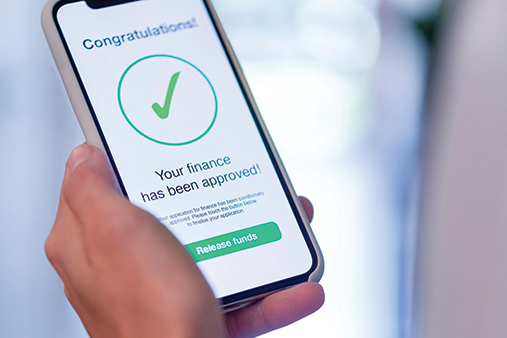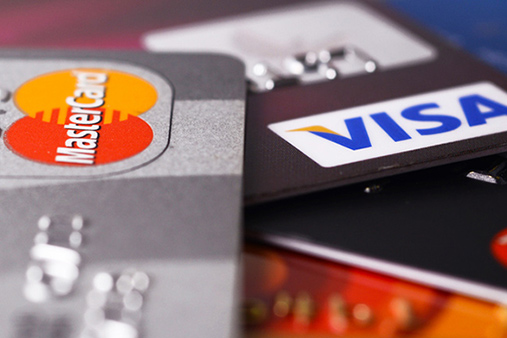How to Open a Business Credit File
Good business credit is critical for a healthy business, especially a small business. Business credit provides cash flow. This allows your company to buy goods and services, pay employees, pay bills, and conduct other important business.
To establish business credit for the first time, you need to open a business credit file. Read our How to Open a Business Credit File guide below for more information.
Recommended: Visit Nav, our No. 1 business credit monitoring service, to get a copy of your company’s business credit report.

Opening a Business Credit File With the Business Credit Bureaus
Opening a business credit file requires a number of steps:
1. Register Your Business Entity
Businesses must be registered with the state in order to start a business credit profile.
There are three main types of business entities: sole proprietorship, LLC, and corporation.
Very few states register sole proprietorships, and sole proprietorships don’t provide any asset protection to business owners in the event that the business suffers a loss. If you are running a business and haven’t registered it as an LLC or corporation, you are most likely running a sole proprietorship and won’t be able to build business credit.
Most business owners will benefit most from starting an LLC. Only small businesses that need to attract investors should start a corporation.
Recommended: ZenBusiness will form your LLC for you for $49 (plus state fees).
2. Request an EIN
After you choose a business structure, you’ll need to set up an Employer Identification Number (EIN). Your company needs an EIN to file a tax return, open a bank account, and apply for a loan.
You can get your EIN for free on the IRS website, via fax, or by mail. To learn more about EINs and how they can benefit your LLC, read our What Is an EIN article.
3. Search for Your Business in Credit Reporting Agency Databases
Before opening a credit file with a credit reporting agency, search its database online to see if you already have a file there. If so, pull your business credit report and review it for factual accuracy.
4. Apply for a DUNS Number
A DUNS number is a nine-digit identifier obtained through Dun & Bradstreet. This number identifies your business as a unique, separate entity. Creditors use your DUNS number to look up your business credit file to find your credit history.
5. Set Up a Separate Business Bank Account and Phone Number
Opening a business checking account will separate your business and personal finances. A business bank account also will make your company more financially secure and give you access to loans.
You can open a business bank account by going to one of the many online banks that offer this service, such as Chase Bank and BlueVine. For a list of our recommended business bank accounts, read our guide to the best banks for small business.
In addition to a business bank account, you will also need a business phone number to open a credit file with the major credit bureaus.
6. Establish Net 30 Accounts With Suppliers or Lenders That Report to the Credit Bureaus
Net 30 accounts are lines of credit that vendors grant to businesses. Most net 30 vendors report to the business credit bureaus.
Be sure to pay your net 30 accounts within 30 days of the invoice date. A good payment history is critical for boosting your credit score.
Recommended: Check out our net 30 vendor list to find applicable vendors for your business and help you get started building business credit.
7. Apply for a Business Credit Card
Getting a business credit card will help in establishing business credit. The business credit bureaus will start to notice your business because the credit card company will report your account activity to them.
To get a business credit card:
- Research business credit card options online and choose one that offers the most useful benefits.
- Apply for the offer by filling out the business credit card application form online. Be sure to use your EIN and not your Social Security number.
- Wait a week or two for a mailed response.
- Start using your new business credit card, and be sure to pay the card balance in full each month.
Recommended: Visit BILL to apply for their business credit card and build your business credit quickly.
8. Establish Store Credit Card Accounts
Stores that provide store credit cards can also report to the business credit bureaus. Six months after you establish your net 30 accounts and have built up a credit history, apply for in-store credit cards. These cards offer revolving lines of credit that can further establish your business credit profile.
Why You Need a Business Credit File
There are several reasons to open a business credit file and start building business credit:
- Purchasing equipment. Buying equipment requires a significant upfront expenditure, even if it saves money in the long run. A business credit file showing a good business credit score will help you obtain the funds your company needs.
- Sustaining your business. Good cash reserves will help you weather an economic downturn, even if you’re not making a profit.
- Increasing your business’s value. Investors and buyers are attracted to companies with good business credit. Keep this in mind when writing a business plan.
- Building business relationships. Good relationships with vendors, suppliers, manufacturers, merchants, and others are crucial for a successful business. Having the cash to pay debts on time helps build those relationships.
What Are the Major Business Credit Reporting Bureaus?
To monitor your business credit, regularly pull your business credit reports and check your business FICO score. Here are the major business credit reporting bureaus where you can do that:
- FICO Small Business Scoring Service (SBSS) Score (scores creditworthiness from 0-300).
- Dun & Bradstreet PAYDEX Score (scores creditworthiness from 0-100).
- Experian Intelliscore Plus Credit Score (scores creditworthiness from 1-100).
- Equifax Payment Index Score (scores creditworthiness from 1-100), Business Credit Risk Score (scores risk from 101-992; the higher the score, the lower the risk), and Business Failure Score (scores risk from 1,000-1,610; the higher the score, the better likelihood your business will still be around in 12 months).
How to Pull Your Small Business Credit Report
The major business credit bureaus create your business credit file. These business credit bureaus gather business and credit data on millions of companies around the world.
The data comes from a variety of sources, including UCC filings, payment history from financial institutions, incorporation filings, print and online directories, business registrations, and elsewhere.
Learn how to pull your credit reports and check your business FICO score with our guides:
- Dun & Bradstreet Credit Report
- Experian Business Credit Report
- Equifax Business Credit Report
- Business FICO Score
A business credit monitoring service can save you time by monitoring your company’s credit reports and offering advice on how best to build business credit.
You can also pull your credit report using a credit reporting service.
Recommended: Get started with Nav. They’ll help you open, maintain, and monitor your business credit.
How to Protect Your Company’s Credit
Protecting your company’s credit is vitally important for its long-term viability so you can continue to take out loans at reasonable interest rates and otherwise maintain cash flow. Here are some tips:
Pay All Bills and Credit Lines On Time
Failing to pay your bills and credit lines on time will hurt your company’s credit. A poor payment history will lower your business credit score, which will give new lenders pause and lead them to charge your company higher interest rates because it’s perceived to be a higher risk. Alternatively, they may not lend to your company at all.
Check For and Fix Any Errors or Discrepancies in Your Credit Report
Unlike personal credit reports, business credit reports aren’t usually free. Still, it’s important to regularly monitor your business credit scores and read your credit reports thoroughly.
When you read through your reports, let the credit reporting agency know about any incorrect or inconsistent data. This includes business information like your company’s phone number, website, address, etc.
Don’t Use Predatory Lenders
Loan sharks are adept at victimizing businesses eager to build business credit. Only take loans you know you can afford to repay, and especially avoid those with high daily interest rates.
Don’t Pay Business Debts With Personal Accounts
Mingling business and personal funds is rarely a good idea, especially when it comes to paying debts. Lenders who notice that you’re paying your company’s debts with personal funds may conclude that you don’t have enough cash flow to take on new debt.
Frequently Asked Questions
To build business credit fast, you’ll need to form an LLC, get an EIN, get a business bank account, credit card, website, and phone line, establish net 30 vendor accounts, apply for in-store credit cards, ask for higher net 30 credit lines, and apply for business loans.
If you are just starting to build business credit, your personal credit can affect business lending decisions. To build business credit with bad personal credit (or no personal credit at all), apply for an EIN and take the other steps above to build business credit fast. Pay back the balances due on all loans, credit cards, and other debts promptly every month to build business credit.
This can take anywhere from a couple of days to several months, depending on the lender. Online lenders tend to approve lines of credit faster than banks, and the Small Business Administration (SBA) is usually the slowest option.





